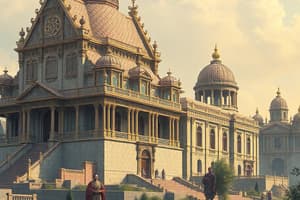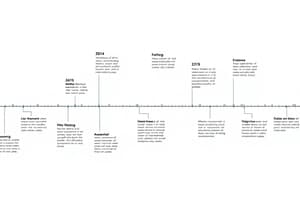Podcast
Questions and Answers
What is the primary purpose of historians in studying the past?
What is the primary purpose of historians in studying the past?
- To ask questions and make interpretations based on evidence (correct)
- To simply record events
- To predict the future
- To recreate the past exactly as it was
What is the main difference between the age of bands and the age of tribes?
What is the main difference between the age of bands and the age of tribes?
- The size of the groups
- The type of food they ate
- The level of technology used
- The location of their settlements (correct)
What is a characteristic of the age of kingdoms?
What is a characteristic of the age of kingdoms?
- People started to trade with each other (correct)
- People did not believe in gods
- People only grew their own food
- People lived in small nomadic groups
What happened to many countries after 1500?
What happened to many countries after 1500?
What is true about the way people lived during the age of bands?
What is true about the way people lived during the age of bands?
What is a main characteristic of the 20th century?
What is a main characteristic of the 20th century?
What is a main difference between primary and secondary sources?
What is a main difference between primary and secondary sources?
What do historians use to help them think about the past?
What do historians use to help them think about the past?
What happened to the way people made things during the age of empires?
What happened to the way people made things during the age of empires?
What is true about the size of kingdoms?
What is true about the size of kingdoms?
Flashcards are hidden until you start studying
Study Notes
Understanding Time in History
- AD/BC are used to measure time, with AD meaning "in the year of the Lord" and BC meaning "before Christ"
- A decade is a period of 10 years, a century is a period of 100 years, and a millennium is a period of 1000 years
Historical Enquiry and Research
- Historians start with enquiries, asking questions to learn about the past
- Historians use primary and secondary sources to research the past
- After research, historians reach interpretations about the past
- Historians can choose how to represent their work
- Historians think about periods of time to understand the past
The Age of Bands (before 10,000 BC)
- Humans lived in groups of 30-50 people, were nomadic, and used basic tools
- People depended on animals to survive
- Life during this period was nomadic, with people living in small groups and using basic tools for survival
The Age of Tribes (10,000 BC - 3000 BC)
- People started to live in static settlements
- Trade began during this period
- People grew their own food
- Historians use concepts to think about the past and identify changes and consistencies between periods
The Age of Kingdoms (around 3000 BC)
- Kingdoms started to appear around 3000 BC
- Most people still farmed and made goods at home
- People began to believe in gods
- Kingdoms could contain several million people
Major Changes in History (after 1500)
- Many countries built large empires
- Factory production began
- People started to stop believing in God in some parts of the world
- Empires might contain many millions of people
- Countries began to argue for independence in the 20th century
- Most countries gained independence in the 20th century
Studying That Suits You
Use AI to generate personalized quizzes and flashcards to suit your learning preferences.





